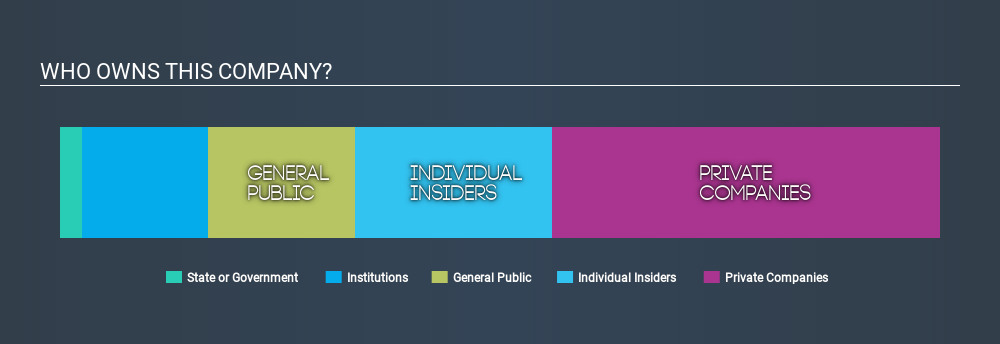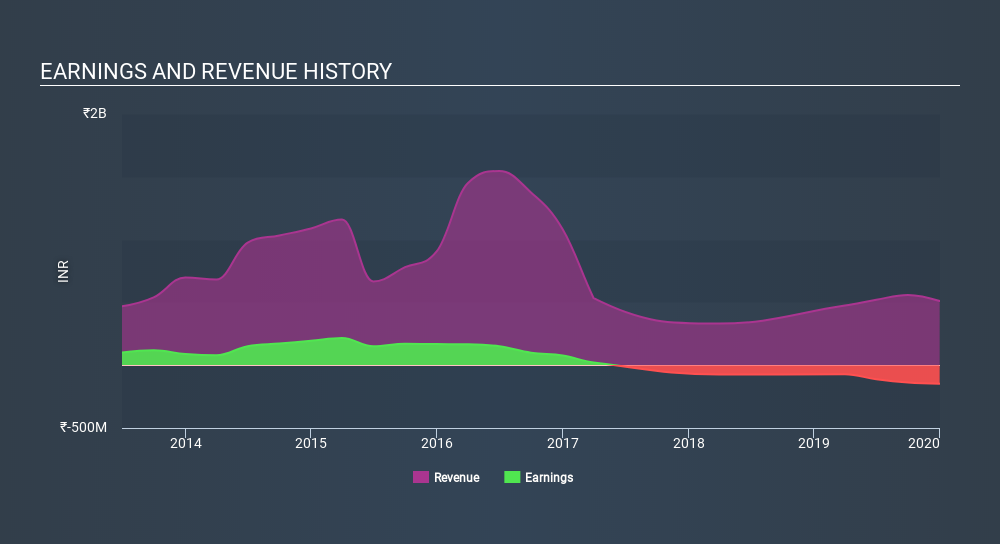- India
- /
- Real Estate
- /
- NSEI:PODDARHOUS
What Kind Of Investor Owns Most Of Poddar Housing and Development Limited (NSE:PODDARHOUS)?

A look at the shareholders of Poddar Housing and Development Limited (NSE:PODDARHOUS) can tell us which group is most powerful. Generally speaking, as a company grows, institutions will increase their ownership. Conversely, insiders often decrease their ownership over time. Warren Buffett said that he likes "a business with enduring competitive advantages that is run by able and owner-oriented people." So it's nice to see some insider ownership, because it may suggest that management is owner-oriented.
With a market capitalization of ₹1.1b, Poddar Housing and Development is a small cap stock, so it might not be well known by many institutional investors. Our analysis of the ownership of the company, below, shows that institutions are noticeable on the share registry. Let's delve deeper into each type of owner, to discover more about Poddar Housing and Development.
Check out our latest analysis for Poddar Housing and Development

What Does The Institutional Ownership Tell Us About Poddar Housing and Development?
Institutions typically measure themselves against a benchmark when reporting to their own investors, so they often become more enthusiastic about a stock once it's included in a major index. We would expect most companies to have some institutions on the register, especially if they are growing.
We can see that Poddar Housing and Development does have institutional investors; and they hold 14% of the stock. This can indicate that the company has a certain degree of credibility in the investment community. However, it is best to be wary of relying on the supposed validation that comes with institutional investors. They too, get it wrong sometimes. If multiple institutions change their view on a stock at the same time, you could see the share price drop fast. It's therefore worth looking at Poddar Housing and Development's earnings history, below. Of course, the future is what really matters.

We note that hedge funds don't have a meaningful investment in Poddar Housing and Development. The company's largest shareholder is Poddar Amalgamated Holdings Pvt. Ltd., with ownership of 29%, The second and third largest shareholders are Rohitashwa Poddar and Poddar Bhumi Holdings Ltd, holding 15% and 11%, respectively. Rohitashwa Poddar also happens to hold the title of Chief Executive Officer.
Our analysis suggests that the top 3 shareholders collectively control 55% of the company's shares, implying that they have considerable power to influence the company's decisions.
While studying institutional ownership for a company can add value to your research, it is also a good practice to research analyst recommendations to get a deeper understand of a stock's expected performance. As far I can tell there isn't analyst coverage of the company, so it is probably flying under the radar.
Insider Ownership Of Poddar Housing and Development
The definition of an insider can differ slightly between different countries, but members of the board of directors always count. Company management run the business, but the CEO will answer to the board, even if he or she is a member of it.
I generally consider insider ownership to be a good thing. However, on some occasions it makes it more difficult for other shareholders to hold the board accountable for decisions.
Our most recent data indicates that insiders own a reasonable proportion of Poddar Housing and Development Limited. It has a market capitalization of just ₹1.1b, and insiders have ₹247m worth of shares in their own names. This may suggest that the founders still own a lot of shares. You can click here to see if they have been buying or selling.
General Public Ownership
The general public holds a 17% stake in PODDARHOUS. This size of ownership, while considerable, may not be enough to change company policy if the decision is not in sync with other large shareholders.
Private Company Ownership
It seems that Private Companies own 44%, of the PODDARHOUS stock. Private companies may be related parties. Sometimes insiders have an interest in a public company through a holding in a private company, rather than in their own capacity as an individual. While it's hard to draw any broad stroke conclusions, it is worth noting as an area for further research.
Next Steps:
While it is well worth considering the different groups that own a company, there are other factors that are even more important. Consider for instance, the ever-present spectre of investment risk. We've identified 5 warning signs with Poddar Housing and Development (at least 2 which shouldn't be ignored) , and understanding them should be part of your investment process.
If you would prefer check out another company -- one with potentially superior financials -- then do not miss this free list of interesting companies, backed by strong financial data.
NB: Figures in this article are calculated using data from the last twelve months, which refer to the 12-month period ending on the last date of the month the financial statement is dated. This may not be consistent with full year annual report figures.
Love or hate this article? Concerned about the content? Get in touch with us directly. Alternatively, email editorial-team@simplywallst.com.
This article by Simply Wall St is general in nature. It does not constitute a recommendation to buy or sell any stock, and does not take account of your objectives, or your financial situation. We aim to bring you long-term focused analysis driven by fundamental data. Note that our analysis may not factor in the latest price-sensitive company announcements or qualitative material. Simply Wall St has no position in any stocks mentioned. Thank you for reading.
About NSEI:PODDARHOUS
Poddar Housing and Development
Engages in the real estate construction, development, and other related activities in India.
Good value very low.
Market Insights
Community Narratives



